
During such an intense time in America when it comes to law enforcement and the Black community, it’s easy to think that police accountability is simply left in the hands of other police officers. But the truth is, prosecutors can often determine the fate of many cases before they head to trial. Giving them a power that’s often overlooked in these cases.
While Black women account for a staggering one percent of Black prosecutors across the nation, Judge Faith Jenkins shattered all limits and became one of the only Black attorneys at her firm in the Manhattan District attorney’s office.
Now, you can see the former Miss Louisiana on your television screen in her daytime court television series Judge Faith. Behind the bench, you’ll not only see a no-nonsense judge with more than a decade of experience behind her, but a Black woman who isn’t afraid to use her platform for good.
Whether it’s being outspoken when she sees women allowing men to take advantage of them or changing the lives of Black boys who find themselves in trouble, her work should definitely not be overlooked.
Before being asked to star on a nationally syndicated show back in 2014, Judge Faith was a frequent legal and political commentator on TV news programs. During one of her most note-worthy segments Judge Faith was seen on-screen defending the former First Lady, Michelle Obama whil speaking with former Fox News anchor Bill O’Reilly. She refused to hold her tongue and we love her for it.
In this ESSENCE exclusive, Judge Faith drops some legal gems while opening up about her unique journey to success:
Stepping Into Her Power: I had some really challenging times when I started at the firm. As long as they don’t see you getting ahead of them, there’s no issue. I had days when I cried because I just didn’t know what to do. Finally though, I just said I have a right to be here and work here and have a positive work environment. When you don’t have that diversity there, people don’t know how to handle it.
The Importance Of Diverse Pool Of Prosecutors: When I went to the prosecutor’s office, I realized just how important diversity was because what happens with someone’s case, often times depends on who gets it. They choose people that they think will exercise with discretion, but you have to have people who have different backgrounds and different life experiences that bring that to the table.
Becoming The First Black Miss Louisiana: I never experienced any real cattiness because I pretty much just ran my own race. You were critiqued a lot and that is something that a lot of young women internalize that criticism about themselves. Especially as women, we’re always critiqued a lot on the way we look and that is why at an early age we have to instill that self-esteem in our girls and that value of being proud of who you.
Commanding Respect: If you can’t respect the process then you have to go … because I make it very clear from the beginning who runs the show here. [Some people have] never had a Black woman deciding what their fate is going to be in terms of their case.
Challenging The Stereotypes: My first season, I got so many comments that would write me and say ‘You’re not qualified to be there.’ They didn’t’ read anything about me, they just took one look at me and said, ‘she shouldn’t be there.’ [But I learned that] I don’t have to explain myself to anyone. I’m there because it’s where I’m supposed to be.
Advice For Women Experiencing Challenges At Work: Remember that everybody’s situation is different. When you go to human resources, you just remember that HR is there for the company. I always say to document. You have to create your own documentation in terms of what’s happening and keep a timeline.
Using Her Platform For Change: I started talking about Tamir Rice and John Crawford III in [one of the episodes.] I look for opportunities to do that because it’s important and it’s real life. I have that platform and I have that voice.
To check your local listings to watch Judge Faith, visit here.